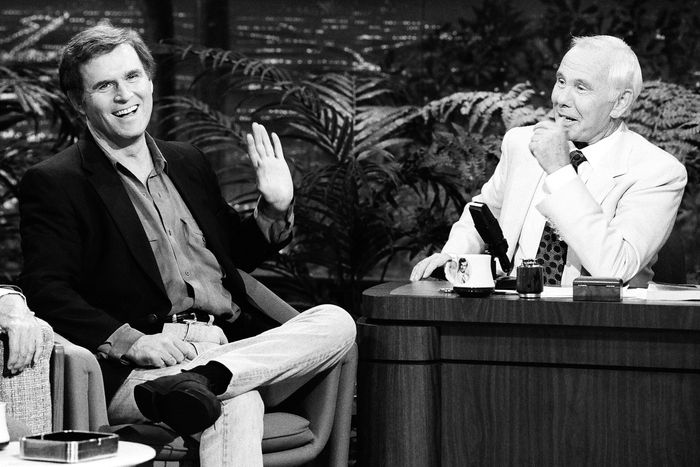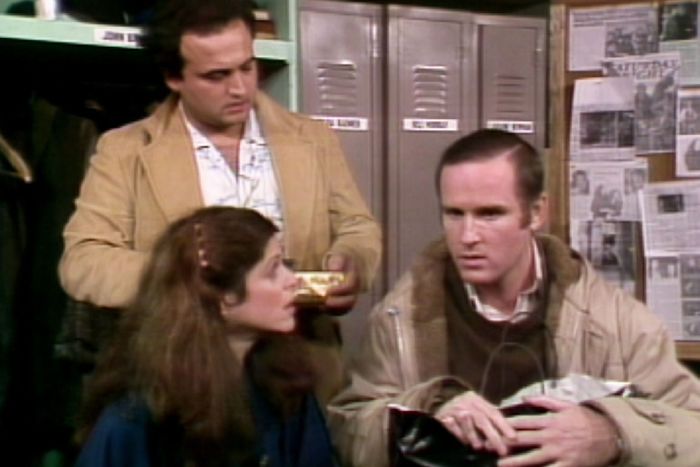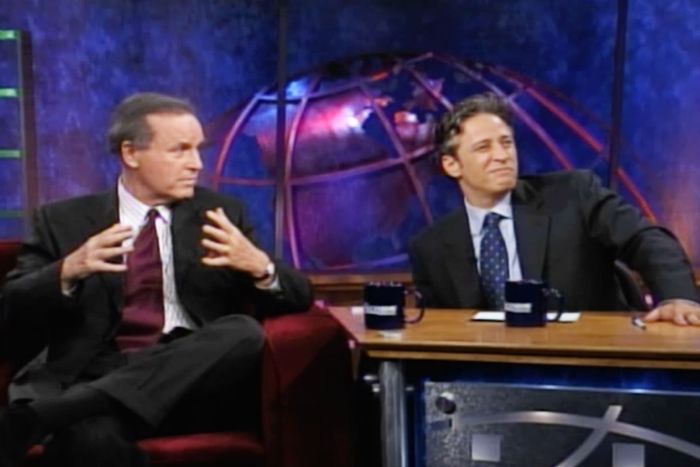
This post was originally published on December 12, 2011. It has been updated following the news of Grodin’s death on May 18, 2021.
Imagine you’re Roman Polanski. (Stay with me, this isn’t going where you think.) It’s 1968, and you’re working on Rosemary’s Baby, a thriller that will go on to earn six Golden Globe and two Academy Award nominations. Everything’s going great until a bit player delays a day of shooting to debate your carefully scripted delivery. “To me, that’s not being a troublemaker — that’s just being alive,” actor Charles Grodin recalls the incident, more Zen than mortified, in a 1997 interview with Charlie Rose. The memory, and the glib explanation of it, exemplifies performer turned pundit Grodin’s infamous churlishness, part of a personality introduced over dozens of wonderfully awkward late-night TV appearances.
Grodin, whose career spanned nearly 50 years, was a well-known thorn in the side of hosts who spent decades dealing with his aggressive demeanor. His early guest appearances on the talk-show circuit were quickly categorized as schtick, the affectation of a combative character whose eye-rolling accusations aimed to expose the fake friendliness of celebrity culture — and to prove that audiences loved the abuse. Throughout his shifting career, Grodin maintained and expanded on this “character,” challenging hosts and audiences to play along with the joke or become the target.
Maybe you’ve only caught glimpses of Grodin — say, on a Miami beach honeymoon in The Heartbreak Kid, or introspectively playing the flute in Thieves (something he actually, sincerely does, about 22:30 in) — or maybe you only remember him “playing straight man to a St. Bernard.” But for better or worse, he holds a place in late-night history for adding some edge to a traditionally smooth-talking time slot.
Grodin studied under famed acting instructor Lee Strasberg, getting his big break in the aforementioned Rosemary’s Baby. Four years later, in 1972, he landed his first starring role in The Heartbreak Kid, written by Neil Simon and directed by Elaine May (one of the founders of the legendary Compass Players, alongside improv guru Del Close). As adult-in-training Lenny Cantrow, whose naïve and self-centric worldview sends him down an impulsive (and, ultimately, emotionally empty) quest to win the woman of his dreams, Grodin brought a charming, hopelessly adolescent air to an otherwise unlikable character. His knack for endowing uncomfortably odd man-children with just the right touch of clueless charm turned him into a bit of a typecast player: 1977’s underrated Thieves (written by Herb Gardner and co-starring Marlo Thomas) saw him as a sour but nostalgic divorcé; 1981’s The Incredible Shrinking Woman made him a supportive, grinning accessory to leading lady Lily Tomlin. He caricatured this persistent, superficially sensitive persona, which dominated the early half of his career, aptly in The Great Muppet Caper:
But, really, who can forget him as the grumpy dad from 1992’s Beethoven (and 1993’s ambitiously immediate sequel, Beethoven’s 2nd), a disgruntled guy who seemed to be in the constant midst of a serious psychotic episode:
Over the years, Grodin’s onscreen focus shifted from literary adaptations to more mainstream family fare, eventually fizzling altogether around 1995, when he quit acting to spend more time with his wife and two kids. But one thread remained constant: his delightfully volatile recurring appearances on post-prime-time staples like The Tonight Show Starring Johnny Carson and David Letterman’s Late Night and The Late Show. Grodin cultivated a character that remained consistently and endearingly brash, a sort of persnickety, both-sides-of-the-Odd-Couple bipolar personality, by turns attention-seeking and insult-slinging.
And then, from 1995 to 1998, CNBC aired The Charles Grodin Show, which found the host interacting with entertainers as often as discussing current events (like the O.J. Simpson trial, a subject he was notably vocal about). When the show first started — Grodin taking over Tom Snyder’s time slot after the icon was handpicked to replace Letterman on The Late Late Show — Entertainment Weekly noted that his hosting style wasn’t as outwardly hostile as his guesting tended to be. But his grave demeanor, never definitively earnest or affected, was outside the established mold: “As a guest on Letterman and, earlier, Johnny Carson’s Tonight Show, Grodin excelled at the rude put-on, provoking reaction by seeming to appear angry or offended by his host. Now sitting in the opposite chair, Grodin frequently ignores his guest and gasses on about himself.” He became known for launching into off-topic digressions and demanding more camera time, tics that comic Dana Carvey repeatedly skewered on his short-lived variety show.
After that, Grodin continued to put himself in the public eye, stopping by network studios and phoning in to a variety of issues-focused radio shows. He’s also written several books, including memoirs How I Got to Be Whoever It Is I Am and I Like It Better When You’re Funny. Both include explorations of his involvement with Carson and Letterman, the former volume containing a chapter titled, “Appearing on Johnny Carson and David Letterman to Show the Real Me?” Decades later, Grodin explained — repeatedly — that his off-putting persona was just a put-on. “I think it was defined by the movies,” he told Rose, explaining that his fans expected him to be the same cocky and combative guy he tended to play onscreen. After getting booked on Carson, he felt he had to deliver. “When there’s 600 people out there, and you’re following Diana Ross — who just did a medley of her biggest hits — and nobody knows who you are, what am I gonna do?” His instinct was to argue; even when the seasoned host played along jovially, “I’d say the majority of the audience still felt that I was being unpleasant.” But it kept people tuning in, hoping to catch a few intense “honest” and awkward moments — a breathless Grodin accusing Carson of not caring about his guests, or a tense argument that Letterman diffuses with one-liners delivered straight to the camera — that countered the otherwise saccharine tone of most late-night banter.
Here are a few of Grodin’s greatest moments (those that are available online, at least), from the absurd hosting job that reportedly got him banned from SNL to a more recent battle of wits with Sean Hannity.
Saturday Night Live
When entering their third season in 1977 and dealing with the departure of scene-stealer Chevy Chase, the SNL cast found a familiar spirit in host Grodin. The A.V. Club called this episode “a glorious anomaly, an utterly singular bit of brainy meta-television the likes of which the show hasn’t attempted since,” explaining that “[i]n sharp contrast to his famously prickly talk-show appearances, ‘Charles Grodin’ here is a boyish, daft bungler who never seems to catch on that he’s acting in sketches on live television in front of a studio audience.” Showing up moments before his monologue, Grodin interrupts Gilda Radner and John Belushi’s behind-the-scenes cold open, apologetic about missing rehearsal but laden with Christmas gifts for the cast. (He makes a loaded joke involving Not Ready for Prime Time’s only Black Player: “I couldn’t very well get gifts for some of the cast and not for everyone. If I had forgotten to get a gift for Garrett [Morris] … I mean, can you imagine my embarrassment if I’d forgotten to get a gift for Garrett? I mean, Garrett, especially.”) Operating under the conceit that he’s completely unprepared to tackle the live show, Grodin intentionally stumbles through scenes, peering at cue cards and stretching bits to fill time.
SNL lore has it that Grodin’s antics got him banned from Studio 8H; he later explained the incident to Nathan Rabin, and his take on it hints there might be some truth to that rumor: “I just got the idea that that would be funny, that I didn’t know it was live, that I had just come in from New York, and then I say, ‘This is live?’ They asked me to do it again, but I chose not to, because I can do two things: I can learn a script, or I can improvise.” He did, however, prepare for his part in The Paul Simon Special, a musical interlude-infused narrative short starring the SNL musical guest shot partially during that same week. (The special is available to view here.)
The Tonight Show Starring Johnny Carson
Grodin’s dark turn on SNL came as no surprise to frequent Tonight Show viewers, who had seen the actor butt heads with their favorite host. Carson was the perfect foil for Grodin; friendly and always willing to roll with the punches, he also had an appreciation for the absurd. One night, for example, when his jokes got zero laughs from the studio audience, he staged an impromptu cleansing ritual by burning his script onstage (while the band played “Taps,” natch). It’s no surprise that, after appearing on the show twice, Grodin was offered an exclusive contract as a guest on the show (he notes in his memoir I Like It Better …, straight off the bat in chapter one, that this was a near-unprecedented honor). Interactions between Grodin and Carson are edgily jovial, almost like a tense family gathering; as Grodin lobs barbs at Carson and the industry in general, he’s met with good-natured ribbing, and there are many moments when one or both appear on the verge of breaking. Take this clip from Grodin’s September 1990 appearance on the show:
“I’m so sensitive I really can’t answer a question from someone who’s not interested in the question,” Grodin counters when Carson asks about his acerbic attitude. Most of their “arguments” center around accusations that the professional conversationalist doesn’t really care about his interviewees, or that he only focuses on trite topics; interestingly, the views of Grodin’s allegedly caricatured personality seem to fit pretty nicely alongside his current cultural commentaries.
Late Night and The Late Show With David Letterman
“I really feel tonight it won’t suck,” Letterman reportedly told his crew before each of Grodin’s appearances. On Late Night, Grodin expanded his repertoire by planning scripted bits; one time he showed up to an empty studio, only to be told that the gap-toothed host was home waiting for a cable installation and couldn’t make it to the interview. An outraged Grodin harangued Letterman, who was in on the joke and broadcasting from his office. For another appearance, Grodin hired a supporting cast: “One time on Letterman, I actually brought a vaudeville comic on as my attorney, threatening to sue Letterman for remarks that were made … the previous week.”
Prime Time and beyond
When Grodin quit acting and joined the ranks of celebrities trying their hand at hosting, he raised a few eyebrows. “I just really didn’t want to be an actor anymore,” Grodin told a Florida newspaper. “[W]hen you’re speaking what you think … it’s such a pronounced difference in what your sense of who you are as a person is. Imagine instead of talking to me as you are, you were pretending you were someone else.” His show earned him a reputation beyond what people were used to seeing on TV — but that doesn’t mean he abandoned his act.
“So far, this is one of the most humiliating experiences I’ve had. And I’ll tell you why …” Before he’s fully seated, the tone for Grodin’s 2002 talk with Daily Show host Jon Stewart is set, as he sounds off on having to stand near the audience while waiting offstage.
From the first few moments on his 2007 appearance on Hannity & Colmes, when he accuses co-host Colmes of needing some eyeliner (?), Grodin’s totally golden, derailing every effort to focus on substantive issues with jabs at Hannity’s casual jeans and interest in karaoke, insisting he’s not going to speculate on the upcoming presidential election “because I don’t think you guys should even be talking about it.” At one point, Hannity tries to fight back with: “I watched your show, and you know why? Because I thought the night was coming where you were gonna just lose it and they’d have to take you out to the hospital.” Less than 30 seconds later, Grodin interrupts an attempt to steer the conversation in a more relevant direction with “Is that a hairpiece?”, leaning over to give Hannity’s head an interrogative tug. Fast-forward a minute, and his arms are in the air while he calls Hannity a “right-wing fascist.” Commercial break!
For years, Grodin remained one of the most captivating guests on late night’s regular roster, because he was one of the only performers who pushed the boundaries of what audiences would and wouldn’t stand for and what hosts were willing to allow. Originally born from a fear of appearing too bland, Grodin’s played-up personality had the desired effect of making him a household name; whether you rooted for or against him, chances were you’d be talking about him the morning after.
So next time you detect an intentionally hostile yet hilarious late-night guest appearance, know who you have to thank for bringing awkward, heavy-handed humor to late night. “I just heard recently that Bette Midler actually was nominated (for an Emmy, which she won in 1993) for an appearance on the Johnny Carson show,” Grodin noted to the Los Angeles Times in 1995. “I didn’t know you could get nominated as a guest. I could have been nominated as Best Actor on a Talk Show — that might have been my category. I would have taken some ads out.”



